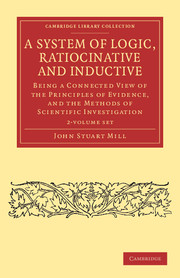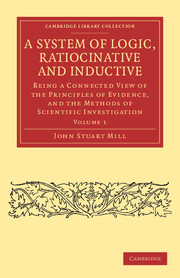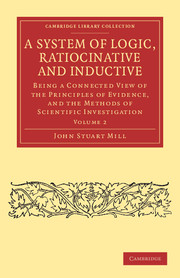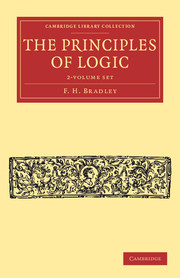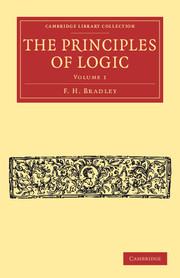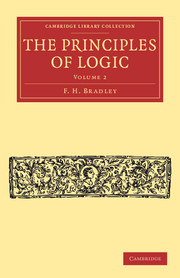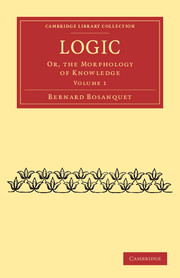A System of Logic, Ratiocinative and Inductive
Being a Connected View of the Principles of Evidence, and the Methods of Scientific Investigation
2 Volume Paperback Set
Part of Cambridge Library Collection - Philosophy
- Author: John Stuart Mill
- Date Published: December 2011
- availability: Temporarily unavailable - available from TBC
- format: Multiple copy pack
- isbn: 9781108040907
Multiple copy pack
Looking for an inspection copy?
Please email [email protected] to enquire about an inspection copy of this book
-
This two-volume work, first published in 1843, was John Stuart Mill's first major book. It reinvented the modern study of logic and laid the foundations for his later work in the areas of political economy, women's rights and representative government. In clear, systematic prose, Mill (1806–73) disentangles syllogistic logic from its origins in Aristotle and scholasticism and grounds it instead in processes of inductive reasoning. An important attempt at integrating empiricism within a more general theory of human knowledge, the work constitutes essential reading for anyone seeking a full understanding of Mill's thought. Volume 1 contains Mill's introduction, which elaborates upon his definition of logic as 'not the science of Belief, but the science of Proof, or Evidence'. It also discusses methods of logical reasoning - propositions and syllogisms. Volume 2 contains 'On the Logic of the Moral Sciences', in which Mills applies empirical reasoning to human behaviour.
Customer reviews
Not yet reviewed
Be the first to review
Review was not posted due to profanity
×Product details
- Date Published: December 2011
- format: Multiple copy pack
- isbn: 9781108040907
- length: 1240 pages
- dimensions: 218 x 140 x 70 mm
- weight: 1.6kg
- availability: Temporarily unavailable - available from TBC
Table of Contents
Volume 1: Preface
Introduction
Book I. Of Names and Propositions:
1. Of the necessity of commencing with an analysis of language
2. Of names
3. Of the things denoted by names
4. Of propositions
5. Of the import of propositions
6. Of propositions merely verbal
7. Of the nature of classification, and the five predicables
8. Of definition
Book II. Of Reasoning:
1. Of inference, or reasoning, in general
2. Of ratiocination, or syllogism
3. Of the functions, and logical value, of the syllogism
4. Of trains of reasoning, and deductive sciences
5. Of demonstration, and necessary truths
6. The same subject continued
Book III. Of Induction:
1. Preliminary observations on induction in general
2. Of inductions improperly so called
3. On the ground of induction
4. Of laws of nature
5. Of the law of universal causation
6. Of the composition of causes
7. Of observation and experiment
8. Of the four methods of experimental inquiry
9. Miscellaneous examples of the four methods
10. Of plurality of causes
and of the intermixture of effects
11. Of the deductive method
12. Of the explanation of laws of nature
13. Miscellaneous examples of the explanation of laws of nature. Volume 2: Book III. On Induction (continued):
14. Of the limits to the explanation of laws of nature
and of hypotheses
15. Of progressive effects
and of the continued action of causes
16. Of empirical laws
17. Of chance, and its elimination
18. Of the calculation of chances
19. Of the extension of derivative laws to adjacent cases
20. Of analogy
21. Of the evidence of the law of universal causation
22. Of uniformities of co-existence not dependent upon causation
23. Of approximate generalizations, and probable evidence
24. Of the remaining laws of nature
25. Of the grounds of disbelief
Book IV. Of Operations Subsidiary to Induction:
1. Of observation, and description
2. Of abstraction, of the formation of conceptions
3. Of naming, as subsidiary to induction
4. Of the requisites of a philosophical language
and the principles of definition
5. Of the natural history of the variations in the meaning of terms
6. The principles of a philosophical language further considered
7. Of classification, as subsidiary to induction
8. Of classification by series
Book V. On Fallacies:
1. Of fallacies in general
2. Classification of fallacies
3. Fallacies of simple inspection, or à priori fallacies
4. Fallacies of observation
5. Fallacies of generalization
6. Fallacies of ratiocination
7. Fallacies of confusion
Book VI. On the Logic of the Moral Sciences:
1. Introductory remarks
2. Of liberty and necessity
3. That there is, or may be, a science of human nature
4. Of the laws of mind
5. Of ethology, or the science of the formation of character
6. General considerations on the social science
7. Of the chemical, or experimental method in the social science
8. Of the geometrical, or abstract method
9. Of the physical, or concrete deductive method
10. Of the inverse deductive, or historical method
11. Of the logic of practice, or art
including morality and policy.
Sorry, this resource is locked
Please register or sign in to request access. If you are having problems accessing these resources please email [email protected]
Register Sign in» Proceed
You are now leaving the Cambridge University Press website. Your eBook purchase and download will be completed by our partner www.ebooks.com. Please see the permission section of the www.ebooks.com catalogue page for details of the print & copy limits on our eBooks.
Continue ×Are you sure you want to delete your account?
This cannot be undone.
Thank you for your feedback which will help us improve our service.
If you requested a response, we will make sure to get back to you shortly.
×
